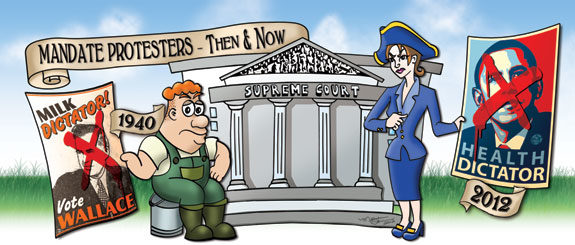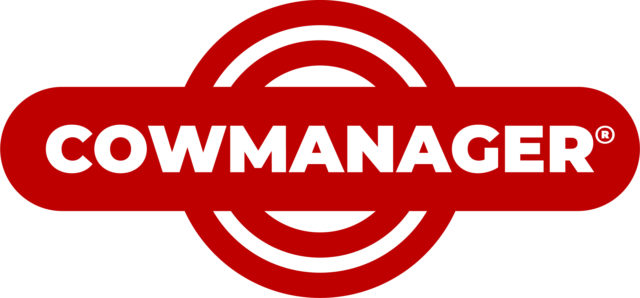“DAIRY VICTORIOUS IN MILK DICTATOR SUIT OF WALLACE” read the headline on October 30, 1940 edition of the Chicago Daily Tribune. The lead says, “The attempts of Henry A. Wallace as secretary of agriculture to force an Illinois dairy to comply with his milk marketing regulations, although it is not engaged in interstate commerce, met defeat yesterday.”
The Illinois dairy was then located on North Ashland in the Lakeview Community of Chicago – only a few blocks from where it started on Wrightwood Avenue, thus its name, Wrightwood Dairy Company.
This small dairy acquired its milk supply from about 70 dairy farms, all located in Illinois, and sold its milk and milk products to only Illinois consumers.
It was among a number of similarly small dairy concerns located throughout the city. According to court records, 70 percent of the milk marketed in the area came from farms within Illinois.
Wallace, then the secretary of state and later vice president, used the authority Congress granted him in the Agricultural Marketing Agreement Act of 1937.
In 1939, he issued a milk marketing regulation for the marketing area of Chicago, Order No. 41.
In response to the dairy’s refusal to comply with the regulations, Wallace asked a U.S. District Court to enjoin, or prohibit, Wrightwood from buying milk from producers in violation of the provisions of the order. Wrightwood in turn asked the court to stop the government from interfering with its business.
Wrightwood argued that Congress could not confer such power. Because the Constitution gave Congress the authority to regulate only interstate commerce and the Tenth Amendment kept all other powers with the states, any act that purported to give a federal official authority over intrastate commerce went beyond the bounds of the Constitution.
The government claimed that in order to regulate interstate commerce it had to also regulate intrastate commerce that came in contact with the interstate flow.
The U.S. District Court sitting in Chicago agreed with Wrightwood and dismissed the complaint of the federal government.
At the same time, it ordered the government to stop interfering with the business affairs of Wrightwood. Not every dairy industry participant liked the decision.
Fundamentally, the larger dairy plants in the city who purchased much of their milk from Wisconsin liked the rules. The smaller dairies in the city like Wrightwood were fighting the rules. At the time there were five other cases pending. Wrightwood’s came up first.
The government appealed the case to the Federal Court of Appeals for the Seventh Circuit. The three judges of that court, too, agreed with Wrightwood.
In response to the claim of the federal government that to regulate interstate commerce required regulation of intrastate commerce, that court said there was a break in authority between the limited powers of the U.S. and broader powers of the states within their boundaries.
The court held that to overcome this “hiatus,” or incompleteness, between the limited powers of the U.S. government and those held by the states required a cooperation between the states and the nation, not for the nation to overcome the power of the states.
This hiatus, it said, “is implicit in a federal system of government.”
In a statement of modern constitutional reality, it said: “If the powers of the national government were complete and the states were only administrative agencies whose powers existed solely at the sufferance of the national government, this difficulty, at least, would cease to exist.” Stated otherwise, the national government would have no bounds to its powers and states would merely oversee its rules.
Still beaten, the USDA took the case to the U.S. Supreme Court, which agreed to hear it, making headlines just two days after the bombing of Pearl Harbor.
After hearing arguments and considering briefs, the court unanimously reversed the lower courts’ decisions and stated:
We think there is no such hiatus. Congress plainly has power to regulate the price of milk distributed through the medium of interstate commerce, and it possesses every power needed to make that regulation effective.
The power of Congress over interstate commerce is plenary and complete in itself, may be exercised to its utmost extent and acknowledges no limitations other than are prescribed in the Constitution.
It follows that no form of state activity can constitutionally thwart the regulatory power granted by the commerce clause to Congress.
This authority of the federal government to limit economic liberty was now, in the court’s word, “plenary” or complete.
The Wrightwood case represents one of the first cases where the Supreme Court held that Congress had authority over purely intrastate commerce. It extended the holding in U.S. v. Rock-Royal Cooperative that held Congress could regulate interstate commerce under the milk marketing orders.
Wrightwood was the basis for another decision later that year that held that Roscoe Filburn, a wheat farmer near Dayton, Ohio, who raised only wheat for his own use, was subject to federal regulation.
The extent of this involvement into state commerce continued. Among other things, the court has held over the years that the commerce power allowed Congress to regulate intrastate bootlegging of liquor and state laws permitting medicinal use of marijuana.
Economic regulations transfer economic value and power from some participants to others. The argument is that the free market is unstable and the only way to bring order is for the government to have some market participants subsidize others.
It is almost a given today that Congress can do this and does through hundreds if not thousands of laws covering almost all aspects of the economy.
As well settled as this point of law seems today, it was not so settled when Wrightwood and the other dairies went to court. Just consider that four federal judges agreed with the dairy that Congress had no authority.
The wording of the Tribune headline, remember the wording of “dictator,” shows the sensibilities in favor of economic freedom of that time.
Today a Jewel Food store sits at the site of the former dairy, which is long since gone, and the dairy farmers who served it are no longer around. But the desire to be free of government intrusion into economic life continues to resonate.
In 2010, Congress, along deeply divided political party lines, passed the highly controversial Patient Protection and Affordable Care Act, which has now become known as Obamacare.
At the heart of the debate is the personal mandate – that the federal government demands individuals purchase insurance whether they want to or not. Opponents claim that the act gives the federal government the power to dictate personal health decisions even to the point of limiting care.
To them it is not about some business regulation, it is about their own lives. States argue that it is the states, not the federal government, that has this authority and they did not give the federal government authority to regulate these decisions.
The debate over this issue and others stirs deep emotional and philosophical expressions, but the fight is now a legal one.
Shortly after this article appears, the Supreme Court will decide whether or not the personal mandate is constitutional.
The key issue in the health care challenge focuses on the mandatory payment by all individuals, either by purchasing health insurance or a penalty.
The legal question is whether or not the power of the federal government can go beyond regulating interstate commerce between individuals to the point of requiring individuals to actually enter into commerce when they otherwise would not.
The health care law requires the young and healthy who need no health insurance to pay into the pool so that the premiums for those who do need health insurance are lower. That is it compels the healthy to subsidize the unhealthy.
In milk regulation, such as what Wrightwood faced, the idea is to force every buyer of milk into the pool so that those with higher value sales share with those of lower value.
The government sought to bridge this gap of compulsory payment by saying that even though someone is not in the market now, they will be eventually and the prospective obligation is a logical extension of the Wrightwood and other interstate cases.
Note this line of argument on consumers of milk between the Solicitor General Donald Verrilli, the government’s chief attorney, and the chief justices:
VERRILLI: To live in the modern world, everybody needs a telephone. And the same thing with respect to, you know, the dairy price supports that the Court upheld in Wrightwood Dairy and Rock Royal .
You can look at those as disadvantageous contracts, as forced transfers. I suppose it’s theoretically true that you could raise your kids without milk, but the reality is you’ve got to go to the store and buy milk.
And as a result of the exercise of the commerce power, you’re subsidizing somebody else [when you buy milk or insurance] because that’s the judgment Congress has made.
KAGAN: And this is especially true, isn’t it, General Verrilli, because in this context, the subsidizers eventually become the subsidized?
VERRILLI: Well, that was the point I was trying to make, Justice Kagan, that you’re young and healthy one day, but you don’t stay that way. And the system works over time.
Justice Scalia then got to the point that the purpose was not to regulate commerce, but rather to subsidize, when he said.
JUSTICE SCALIA: We’re not stupid. They’re going to buy insurance later. They’re young and – and [they] need the money now.
What he was saying was that the government can wait until they enter the market and should not force them into the market.
Those opposed to the individual mandate distinguished the precedent of Wrightwood before the court by arguing that while Congress could regulate the prices paid by plants who voluntarily purchased milk, it could not require that plants buy milk or that producers milk cows. I
n this same vein, the federal government could not force teetotalers to buy liquor as part of regulating liquor markets or others to grow or use marijuana. And certainly, their logic suggests, it cannot force a person to buy something like insurance.
Thus the Supreme Court will consider and decide whether Congress can control intrastate commerce because its authority is truly plenary, or whether there is a break, a hiatus, in its power when it comes to compelling individuals to do something.
The morning after the decision, headlines might read: “People Victorious in Health Dictator Suit.” But if such a headline appears it will be because the Supreme Court saw a difference between regulating plants that buy milk and the insurance market.
Thanks to a suit brought against a small dairy in Chicago, regulating commerce within a state has already been shown to be within the congressional power.
Will health insurance and milk soon share the same compulsory government regulation? Or will the court rule they are different and one is subject to a hiatus from federal regulation? PD







